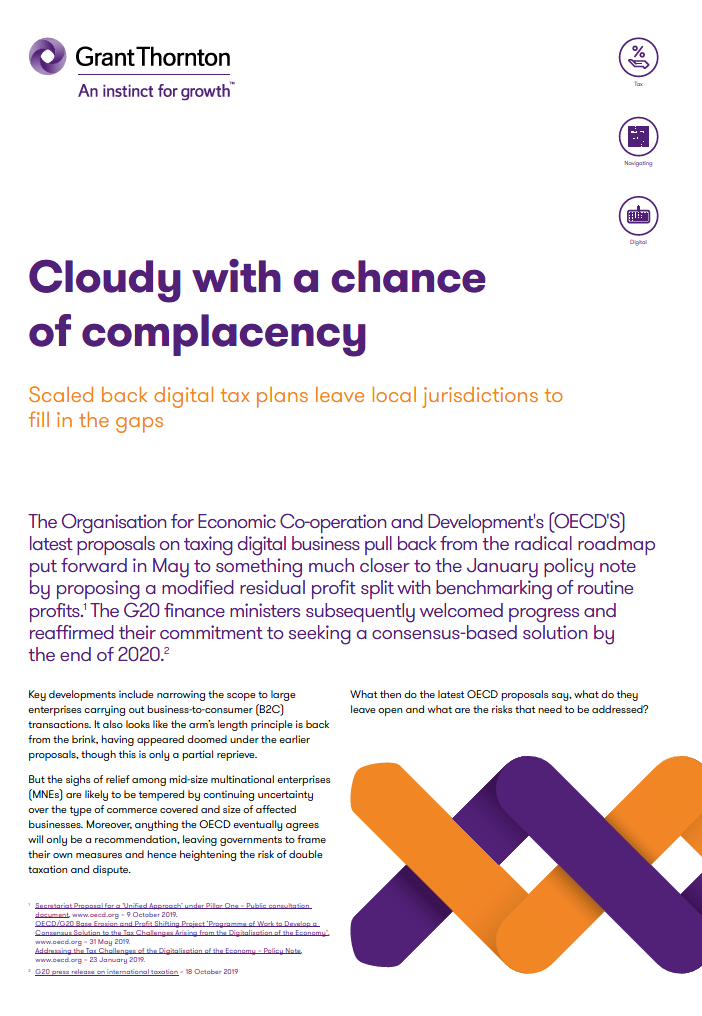-
Corporate Tax
We are your problem solvers for corporate tax issues
-
Restructuring, Mergers & Acquisition
Expertise and creativity for the perfect structure
-
International Tax
We are here, whenever our clients require our assistance
-
Transfer pricing
We are your experts for an optimal transfer pricing structure
-
Indirect Tax & Customs
We take care of your indirect taxes so you can take care of your business
-
Private Wealth
We are your competent partner in the field of Private Wealth Tax Services
-
Real Estate Tax
We are a valuable partner at every stage of your property's life
-
Global Mobility Services
Local roots and global networking as a secret for successful assignment management
-
Advisor for Advisor
As advisors for advisors, we support in complex situations
-
Accounting & Tax Compliance Services
Grant Thornton Austria - Your Partner for Experts for Accounting & Tax Compliance Services. In an evolving regulatory landscape, efficient accounting, tax compliance, and financial statement preparation processes are crucial for maintaining an accurate and up-to-date view of your company’s financial position while ensuring compliance with all legal requirements. We provide tailored solutions that not only save your time and resources but also ensure compliance with complex regulations. Our experts are here to support you, allowing you to focus on your core business.
-
Payroll & People Advisory Services
Ensuring Compliance, Efficiency, and Strategic HR Solutions In an evolving legal landscape, it is crucial for companies of all sizes to have efficient and legally compliant payroll accounting systems. The ever-changing regulations and increasing complexity make this an ongoing challenge. At Grant Thornton Austria, we provide comprehensive, precise payroll processing as part of our Payroll & People Advisory Services. Additionally, we offer customized advisory services to help clients optimise their HR strategy, improve operational efficiency, and minimize potential risks.
-
Tax Controversy Services
Your Partner when it matters most! In increasingly complex environment and considering frequent changes in tax regulations, businesses are facing intensified scrutiny from tax authorities. This has resulted in a significant rise of complex tax audits, investigations and potential disputes. Our Tax Controversy Services are tailored to help you navigate these challenges proactively and effectively. Our experts will guide you through all stages of tax proceedings, ensuring robust defence of your position and advising you on preventive measures to minimize the risk of future tax disputes.
-
Tax Technology Services
Your digital partner for an efficient future! In an increasingly digitalised business world, companies must constantly look for optimisations and adjustments to ensure their long-term success. In order to best prepare for the future and to achieve efficiency increases and process optimisations in the digital area, the experts at Grant Thornton Austria are at your side as a reliable partner as part of our Tax Technology Services.
-
Audit of annual and consolidated financial statements
We place particular emphasis on customized solutions and international service and adapt our services to your needs.
-
Assurance related advisory services
Assurance related advisory services are based on the knowledge and expertise that are the staff of life of our auditors.
-
Global audit technology
We apply our global audit methodology through an integrated set of software tools known as the Voyager suite.
-
Accounting related consulting
Accounting in accordance with UGB, US-GAAP or IFRS is in constant motion. The integration of new regulations into their own accounting systems poses special challenges for companies.
-
Valuation
Valuations are a core competence of Grant Thornton Austria. As auditors and tax advisors we combine profound know-how with our practical experience to offer you customized solutions for your valuation assignment. Our industry expertise is based on years of services to our clients, including listed companies as well as owner-managed companies with an international focus. We advise on valuation matters related to arbitration and provide expert opinions.
-
Forensic Services
When it comes to risks in business, our experts are on hand. We support you not only in suspicious cases or in disputes, but also develop suitable strategies in the area of prevention to avoid serious cases as far as possible. Our Cyber Security team helps you to keep your networks and applications secure and is quickly on hand in the event of a security leak.
-
Cyber Security
Cyber incidents, IT system failures, the resulting business interruptions and the loss of critical data are one of the greatest business risks for companies. Recent cases underline the need for strategic protection and awareness of the issue and require a holistic approach and technical expertise that takes into account all legislative, regulatory and technical aspects of cyber security to protect companies against the daily increase in cybercrime incidents.
-
Sustainability Services
Sustainability is no longer a trend, but the only way to create a future worth living. Our experts will support you in successfully developing your sustainability strategy and preparing your sustainability reporting in compliance with regulations.
-
Transaction Support
We can support you throughout the transaction process – helping achieve the best possible outcome at the point of the transaction and in the longer term.
-
Merger & Acquisition
Companies start new activities and separate from old ones, cooperate and merge. Markets and competitive conditions are subject to constant and increasingly rapid change. As a result, existing business models are changing. Some companies have to restructure and reorganize. But new business opportunities also open up.
-
Restructuring & Going Concern Forecast
Restructuring & Going Concern Forecast: Bundled services for your strategic, operational and financial decisions offer the right answers for companies, banks, shareholders and investors.
-
Internal Audit
Internal Audit helps companies and organisations to achieve their goals by analysing and evaluating the effectiveness of risk management, controls and management and monitoring processes. Internal Audit focuses on independent and objective audit (assurance) and consulting services that improve the value creation and business activities of your company.
-
Expert dispute resolution & advisory
Grant Thornton Austria offers comprehensive services in the field of business-oriented expert services with a broad range of competencies from banking to communication. The core activity of experts is the objective recording of findings and the preparation of expert opinions - regardless of all external circumstances. Our experts Gottwald Kranebitter and Georg H. Jeitler, as sworn and court-certified experts, ensure that the highest professional standards and the principle of objectivity are observed.
-
Blockchain and Crypto-Asset
Blockchain as a carrier technology for crypto currencies and smart contracts, among other things, is becoming increasingly important. Grant Thornton Austria offers comprehensive audit and confirmation services for block chain technologies and business models.
-
International Project Coordination
Our International Engagement Management team is your central point of contact for international projects in all our service lines. We take care of operational project management for you and act as a central point of contact and coordination for your projects. We support companies that start international projects from Austria as well as companies from abroad that want to gain a foothold in Austria or use Austria as a hub for their international projects, especially in the DACH (Germany, Austria and Switzerland) and CEE region.
-
International Desks
As a member of the Grant Thornton network, we guarantee direct access to resources from our worldwide circle of partners. This global connection enables us to seamlessly integrate highly qualified specialists and industry experts from different countries around the world into our teams. Through our broad perspective and diverse expertise, we ensure that we can optimally meet the individual requirements of our clients in an increasingly globalised economy.
The OECD’s latest proposals on taxing digital business pull back from the radical roadmap put forward in May to something much closer to the January policy note by proposing a modified residual profit split with benchmarking of routine profits.
What then do the latest OECD proposals say, what do they leave open and what are the risks that need to be addressed?
OECD roadmap key developments
Some of the latest key developments include narrowing the scope to large enterprises carrying out business-to-consumer (B2C) transactions. It also looks like the arm’s length principle is back from the brink, having appeared doomed under the earlier proposals, though this is only a partial reprieve.
But the sighs of relief among mid-size multinational enterprises (MNEs) are likely to be tempered by continuing uncertainty over the type of commerce covered and size of affected businesses. Moreover, anything the OECD eventually agrees will only be a recommendation, leaving governments to frame their own measures and hence heightening the risk of double taxation and dispute.
What’s been proposed?
On 9 October 2019, the Organisation for Economic Co-operation and Development (OECD) launched its latest attempt to find a workable solution for these vexed digital taxation issues. After floating a radical overhaul in May, which would have caught pretty much every business in its net, the new Pillar 1 (allocation of profit and new nexus rules) proposals appear to be limited to large enterprises that deal with consumers.
The OECD has made an effort to take most small business out of the scope. This includes a combined group turnover threshold – mentioned as €750 million in line with country-by-country (CbC) reporting, but this is only a suggestion for consideration. If €750 million does emerge as the rule of thumb, a good many mid-size MNEs would be covered, rather than just the Big Tech giants. Moreover, like CbC, the door is open to individual markets to lower this, which leaves considerable concern for businesses that do not have a large tax department able to respond to the additional demands.
The OECD has also sought to retain some elements of the arm’s length principle, with a supplement for enterprises that are in scope. The suggested approach consists of a blend of residual profit and a formulaic allocation for each consumer market based on levels of sales. This could be calculated by using consolidated financial statements. The revised proposals recognise that a simultaneous implementation and an effective dispute resolution mechanism are needed to make this viable. Both in turn require a high level of agreement between jurisdictions that could have different and even competing priorities and different formulas.
What’s coming up?
Consultations are ongoing until 12 November 2019. This will be followed by a consultative meeting in Paris on 21 and 22 November. The OECD continues to target a political agreement leading to the basic tax policy architecture to be released in early 2020. This would pave the way for detailed technical work to be carried out during the year.
It’s hoped that some of the grey areas in the OECD proposals can be clarified as part of the consultations and subsequent review of response
What does this mean for your business?
The big shift between the OECD’s May and October proposals turn this from an economy-wide shake-up to a business specific challenge. However, the grey areas within the latest recommendations (eg the uncertain line between B2C and B2B) and how any new rules might be applied on the ground (eg lower turnover thresholds) open up the danger of assuming that you are not in the scope when you are.
Three steps your business can do now to prepare?
- Model impacts of upcoming developments, not just in terms of tax paid and where, but needs and costs of compliance. As part of this assessment, it’s important to understand and plan for multiple eventualities.
- Review organisational structure and supply chains to take account of digital tax and wider developments such as tariffs.
- Reduce the growing risks of dispute by being data-ready (ie evidence-based justification rather than scrambling to respond to an investigation), beefing up documentation in areas such as transfer pricing and reducing uncertainty through steps such as advanced pricing agreements (APAs). While unilateral APAs have been less popular than bilateral or multilateral counterparts due to state aid issues or the BEPS outcome, they may come back into focus as a result of the unilateral developments in digital tax.
If you would like to discuss any of the areas raised in this arcticle, please contact our Transfer Pricing Expert Werner Leiter.


